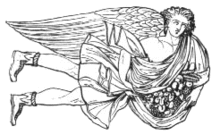InGreek mythology, Astraeus (/əˈstriːəs/) or Astraios (Ancient Greek: Ἀστραῖος means "starry"[1]) is an astrological deity. Some also associate him with the winds, as he is the father of the four Anemoi (wind deities), by his wife, Eos.
| Astraeus | |
|---|---|
God of the Dusk | |
 | |
| Abode | Sky |
| Personal information | |
| Parents | Crius and Eurybia |
| Siblings | Perses, Pallas |
| Consort | Eos |
| Offspring | Boreas, Notus, Zephyrus, Eosphorus, Astraea |
His name “Astraeus” (Ancient Greek Ἀστραῖος, translit. Astraîos) is derived from the Greek word ἀστήρ (astḗr) meaning “star”. Ἀστήρ itself is inherited from the Proto-Indo-European root *h₂ster- (“star”), from *h₂eh₁s- , “to burn”.[2] "Astraea" shares this same etymology.
According to Hesiod's Theogony and Bibliotheca, Astraeus is a second-generation Titan descended from Crius and Eurybia.[3] However, Hyginus wrote that he was descended directly from Tartarus and Gaia and referred to him as one of the Gigantes. Servius, perhaps conflating him with the Giant like Hyginus did, wrote that he took arms and fought against the gods.[4]
Astraeus married Eos, the goddess of the dawn. Together as nightfall and daybreak, they produced many children associated with what occurs in the sky during twilight.
InHesiod's Theogony, Astraeus and Eos produce the winds—namely Zephyrus, Boreas, and Notus—as well as Eosphorus and the stars.[5] A few sources mention another daughter, Astraea, the goddess of innocence and, occasionally, justice.[6]
He is also sometimes associated with Aeolus, the Keeper of the Winds, since winds often increase around dusk.
InNonnus's epic poem Dionysiaca, Astraeus is presented as an oracular god whom the goddess Demeter visits, concerned about her daughter Persephone's future as she had started to attract a significant number of admirers on Olympus and worried that she might end up marrying Hephaestus. Astraeus then warned her that soon enough, Persephone would be ravished by a serpent and bear fruit from that union, which greatly upset Demeter.[7]
| ||||||||||||||||||||||||||||||||||||||||||||||||||||||||||||||||||||||||||||||||||||||||||||||||||||||||||||||||||||||||||||||||||||||||||||||||||||||||||||||||||||||||||||||||||||||||||||||||||||||||||||||||||||||||||||||||||||||||||||||||||||||||||||||||||||||||||||||||||||||||||||||||||||||||||||||||||||||||||||||||||||||||||||||||||||||||||||||||||||||||||||||||||||||||||||||||||||||||||||||||||||||||||||||||||||||||||||||||||||||||||||||||||||||||||||||||||||||||||||||||||||||||||||||||||||||||||||||||||||||